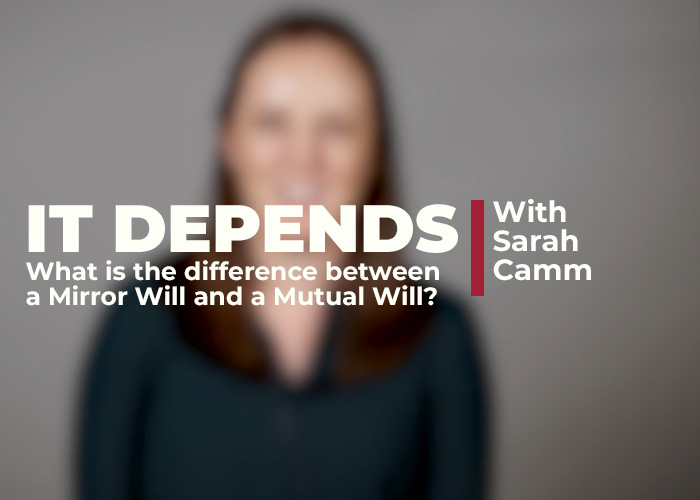Video transcript
Hi and welcome to this week’s episode of It Depends. This week we’ll be talking about mutual Wills, what they are, what their consequences are, and why you might want one.
What’s a mirror Will?
A mirror Will is a Will that has more or less the same terms as someone else’s Will. The terms of the Wills just mirror each other. For example, Vincent and Emma are married and they have one child. Vincent’s Will says I leave all of my estate to Emma and if Emma’s died before me, then to our daughter and Emma’s Will mirrors that and says I leave all of my estate to Vincent and if Vincent’s died before me, then I leave it to our daughter.
What’s a mutual Will?
A mutual Will goes further than just being in agreement about how you want to distribute your estate. You actually have to reach an agreement that you want to make a Will, you want it to be in specific terms, and you’re not going to change the terms of that Will in the future. Couples make mirror Wills all of the time, but whether they’ve actually entered into a binding and enforceable agreement not to change the Will into the future depends on the actual intention and it can be really difficult to prove. Particularly if the terms of the mutual Will agreement aren’t in writing and one of the parties or both of the parties have died.
Who can enter into a mutual Will agreement?
Anyone who’s over 18 has capacity and can enter into a mutual Will agreement. It doesn’t have to be between spouses. They’re usually entered into where you want someone to receive the benefit of your estate while you’re alive. But you and your spouse, for example, ultimately want different people to benefit from your respective estates. We often see them in blended families.
Should I enter into a mutual Will agreement?
It depends. We might suggest a mutual Will agreement in some circumstances, but they can be really risky because they’re really inflexible and strict. They can be breached if the terms of the Will are automatically revoked by divorce or marriage. The surviving spouse could also transfer all of the assets to a new spouse or to a trust, for example, while they’re alive so that their estate has very little value. They could also lead to a risk of dispute on the death of the surviving spouse if they’d repartnered and didn’t provide any benefit for that new partner on their death. There are a number of strategies we can suggest if you want to leave your estate for the benefit of certain beneficiaries while providing for your spouse while they’re still alive. If you’d like to arrange a meeting with one of our estate planning team, please give us a call.





